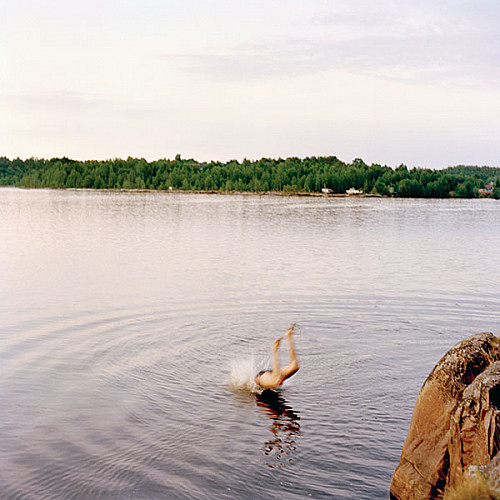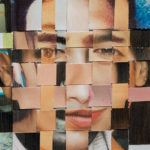Below The Surface
For beauty is nothing but the beginning of terror, which we are still just able to endure, and we are so awed because it serenely disdains to annihilate us.
-Rainer Maria Rilke, The First Elegy or Die Erste Elegie from Duino Elegies
(translated by Stephen Mitchell)
I wobbled as I placed one foot after the other upon pebbles, weeds and variegated aquatic life. My body shrank while I moved further in the cold water. The sun smiled from the clear sky onto a huddle of surrounding trees. I took a deep breath, held it in and dunked my head in the water, prodded my feet up, stretched my arms and nudged my limbs to do their job.
I had done it. I was swimming in a lake. Until I was not.
Anyone who’s had underwater realisations knows how swiftly the interlopers crowd the brain. It occurred to me in quick succession that: regrettably, freestyle was the only stroke I had ever learnt, that I had been an absolute idiot to have not packed my swimming goggles with my bathing suit, and that in the absence of said goggles, plunging my head below the surface, as I was lamentably now doing in order to glide through the water, was nothing but a ludicrous idea. Eyes closed, lungs outperforming the rest of my body, I decided to pull that stupid head out and orient myself.
Thrusting my chest forward to return to an upright position, I careened dizzily. In what I thought was a sharp, winning move, I had another epiphany: a few seconds can yank away the ground from beneath your feet. I panicked and my eyes stung, but I kept them peeled to the front, head out like a dog. Flailing my arms and legs, the very antithesis of poise and grace, I finally emerged standing, my hair a fervid tangle over the face.
The laughable zeal of a rookie.
It was June. The heatwave in Europe was still a few days away, but it had already begun to singe. My friend, with whom I was staying in Berlin, had suggested we go to the Schlachtensee to cool off. “It’s my favourite lake,” she said as though I needed convincing. “It’s beautiful.”
Ever since I learnt to swim five years ago, it had been a dream to go wild swimming. The sea had never inspired such an ambition. Its unknowable vastness, its magnificence when the rough water roars at the shore have always struck terror in me. Too much beauty is a terrifying thing. Stare at the sea long enough, and it’s sure to lob at you the carefully hidden wreckage of your mind.
While there was plenty of sea in Mumbai where I grew up, the subtle and intimate beauty of lakes and rivers was an indulgence I basked in only on television or in books. I first saw real people in real lakes and rivers at the age of 26 during a trip to Germany. How I longed to splash around with the confidence that carried the bathers like invisible floats.
Fling the emptiness out of your arms into the spaces we breathe; perhaps the birds will feel the expanded air with more passionate flying.
“Jamel, tulahi jamel,” my grandfather reassured me that it was never too late to learn to swim. His father had tied him to a rope when he was little and placed him in a deep well in a village not far from Pune. “That was it,” he said, snapping his fingers.
In Mumbai, swimming was an expensive affair, afforded only to those who had memberships at private clubs and gymkhanas. I longed to learn but deferred it to when I’d be an adult. Instead, I devoted my school and college years to athletics, table tennis and badminton.
I finally took the plunge a few years ago, 10 years past adulthood, and signed up for lessons at an Olympic-sized outdoor, municipal pool.
I was convinced that swimming would come to me with the same facility as other sports had. If there was a glaring difference between aquatic activity and terrestrial bipedalism, my hubris didn’t see it. My body, however, did. I couldn’t, for the life of me, synchronise my arms and legs for the breaststroke. I struggled to exhale through my nose underwater, so freestyle, too, became laborious. Floating on my back with the sun gazing at me was out of the question. My poor techniques overall meant that within a few strokes, I was spent. All my flapping and beating amounted to nothing.
Some weeks in, though, the practice paid off. Ditching the breaststroke altogether, I embraced freestyle. I was still quite a straggler. Precocious little kids slithered past me like porpoises, but I didn’t mind. I was prepared for the ultimate test, the coach announced one day as he ushered me to the edge of the deepest end of the pool.
“One. Two. Three. Go.”
I lifted my feet and jumped as high as I could in the air before throwing myself in, body erect, hands to my side. All sounds faded. I dropped deeper and deeper, my lungs keeping unusual pace with the exacting demands of the doughty water. I was inches above the floor when I decided it was time to defy gravity, with a little help from the upward force of the water. At the surface, the coach beamed.
But Nature, spent and exhausted, takes lovers back into herself, as if there were not enough strength to create them a second time.
The depths of man-made swimming pools are profoundly different from those of pools in the wild. Schlachtensee, like many lakes in the northern hemisphere, is a relic from the last ice age which ended about 12,000 years ago. When the glaciers melted, water occupied the basins they had carved. What a privilege it is to be able to float in a bowl-shaped depression in the Earth’s surface!
There are reasons why settlements coalesce around freshwater. The ease of transport of people and goods is one, of course. But mainly there is the promise of sustainability, of harmony and of life itself. Schlachtensee is on the southernmost tip of a chain of lakes around the Grunewald (green forest). Berliners are said to have discovered these lakes in the late 19th century, when there were no roads that led there. People had to walk through the green-leaved forests. Very soon, the area around developed and became a part of Berlin. For a place so ethereal, the lake is easily arrived at by the S-Bahn train.
If being in nature leads to the unfathomable joy of belonging to something larger than your imagined world, it also fills you with utter dread. When we look at nature, we contemplate geologic times, we intuit such enormous things that our imagination feels inadequate and our egos get eroded. To breathe among all that came before you and is destined to outlive you is a special thing. Dreadful as it is, our fleeting existence is the natural order.
How, then, do we imagine the human actions that have unleashed horrors from within the very depths of our nourishing, life-giving forces? How to come to terms with the human warfare against millions of our planetary compatriots that rely as much on natural resources as our rapacity precludes that reliance? How long before swimming in natural holes is no longer feasible?
Today, the dread is of a different, unwelcome kind. ‘Solastalgia’ is the term we now know to explain our ecological grief. Can a neologism, however, help alleviate the hopelessness we feel in the wake of report after damning report highlighting our irreversible impact on the planet?
But we, who do need such great mysteries, we for whom grief is so often the source of our spirit’s growth—: could we exist without them?
You can sense the susurrus of freshwater from a distance. You first catch a glimpse of a quiet surface, and then the expanse reveals itself from behind the trees. When you approach Schlachtensee, you see the burning glow of the sun bouncing off the lake, broken rays of light like tessellating crystal. My friend and I had walked along the lakefront that summer afternoon for about half an hour before we found a perfect spot in the shade of an alder tree, where we spread our towels and settled.
After the mortifying debacle of my first thoughtless adrenaline-powered attempt, I wasn’t sure I wanted to be vanquished by this beast of a lake again. Was I really ready for this pursuit in a place with no lifeguard, no side rails to hold on to, no demarcation of lanes to make sure you are where you’re supposed to be?
“Go ahead,” I told my friend, when she asked me to join her back in the water. I watched her bobbing head grow distant as she swam into the horizon. Around me, there were hundreds of others for whom swimming like this in the wild was just another summertime ritual. I marvelled at their buoyancy.
For me, being there, being able to breathe in that clean air and touch that emerald-green water felt like an extravagance. How had we let our natural environment become a luxury that only a few could afford? I also basked in the freedom of being in a place where a bathing suit didn’t invite unwelcome glances from lascivious men.
Schlachtensee rippled before me. How it carried fragmented realities of our past in its stolid wake. Far, far away from my home city where a river’s name came to sit on all lips only after it choked and spilled, where the sea swells and swallows lives every year, where lakes overflow but taps run dry, where water is central to everyone’s existence, I took a second chance.
I got up, walked in the mud, haltingly made it past pebbles and shrubs and weeds, took a deep breath, held it in, closed my eyes and dunked my head in the water. This time, I trusted it.
Related posts from Verve:
Verve Trending
Sorry. No data so far.
us on Facebook to stay updated with the latest trends






